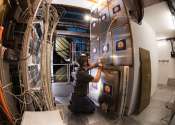Large Hadron Collider experiments bring new insight into primordial universe
(PhysOrg.com) -- After less than three weeks of heavy-ion running, the three experiments studying lead ion collisions at the LHC have already brought new insight into matter as it would have existed in the very first instants ...









